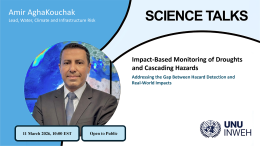On 24 June 2022, UNU-IAS organised an online session of the Sustainability Research & Innovation Congress 2022, exploring the nexus between carbon neutrality and the SDGs with a focus on energy justice.
In opening remarks, Masachika Suzuki (Professor, Sophia University; Adjunct Professor, UNU-IAS) noted that the interlinkages between decarbonisation initiatives and efforts to achieve the SDGs could have both positive and negative implications. He underlined the importance of integrating relevant social justice issues into policy processes.
Mahesti Okitasari (Research Associate, UNU-IAS) outlined the challenges that the Government of Indonesia was facing in managing the carbon neutrality and SDGs nexus, including a lack of coordination to ensure just transition. She remarked that integrating low-carbon policies with development policies while tapping into SDG efforts could help to minimise the trade-offs.
Upalat Korwatanasakul (Research Fellow, UNU-IAS) and Akio Takemoto (Programme Head, UNU-IAS) summarised recent literature on the synergies between the Paris Agreement and the 2030 Agenda for Sustainable Development. Most of the research focused on direct and context-specific impacts of climate mitigation policies, and cross-cutting actions such as innovative education systems and youth empowerment should also be examined to address demand-side mitigation.
Elaborating on the different degrees of synergies and trade-offs between carbon neutrality and the SDGs, Masachika Suzuki shared examples from Japan to underline the importance of designing cross-sectoral policies to help convert trade-offs into synergies.
Paul Hudson (Lecturer, University of York) discussed two community-based projects to restore coastal mangrove forests and an urban canal system, illustrating how positive public perception of nature-based solutions was key to managing the SDG nexus.
Jurgen van der Heijden (Associate, AT Osborne Comp; Associate, GovernEUR/Erasmus University) introduced innovative solutions from the Netherlands where communities have been working together to develop a system to store thermal energy in aquifers, contributing to clean energy and climate adaptation, reducing energy poverty, and providing water purification and soil remediation.
A discussion led by Kanako Morita (Senior Researcher, Forestry and Forest Products Research Institute; Visiting Research Fellow, UNU-IAS) highlighted the need to link the SDGs and climate policies with COVID-19 green recovery, and to implement integrated solutions to manage the SDG nexus.
The Third Global Conference on Strengthening Synergies between the Paris Agreement on Climate Change and the 2030 Agenda for Sustainable Development will be held at UNU on 21–22 July. For more information, please visit the conference website.

